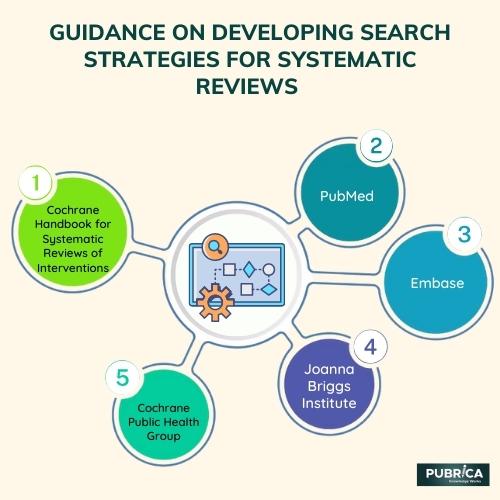
Examples of Search Terms from Published Studies
May 2, 2023
How to Combine Search Terms for Research paper publication?
May 8, 2023In brief
Systematic reviews are a premier source of synthesized information for evidence-based practitioners. As the quantity of published research papers rises, practitioners find it increasingly challenging to identify and incorporate current information. Well-conducted systematic reviews may save practitioners time, enhance evidence-based clinical practice, facilitate health policy decision-making, and serve as a resource in formulating practice recommendations by discovering, assessing, and synthesizing the best research on a particular issue.
Introduction
- Cochrane Handbook for Systematic Reviews of Interventions: This handbook provides detailed guidance on developing search strategies for systematic reviews, including the use of Boolean operators, truncation, wildcards, and MeSH terms. The handbook also includes examples of search strategies used in Cochrane systematic reviews. (https://training.cochrane.org/handbook/)
- PubMed: PubMed is a database of biomedical literature maintained by the National Library of Medicine. The database includes a tutorial on searching PubMed and a list of search filters and tools to help refine search strategies. (pubmed.ncbi.nlm.nih.gov/)
- Embase: Embase is a biomedical database that includes a tutorial on developing search strategies, as well as a list of search filters and tips for optimizing search results.
- Joanna Briggs Institute: The Joanna Briggs Institute provides guidance on developing search strategies for systematic reviews in several fields, including nursing, public health, and allied health. The Institute offers a search strategy builder tool that helps users create search strategies using Boolean operators and MeSH terms.
- Cochrane Public Health Group: The Cochrane Public Health Group provides guidance on developing search strategies for systematic reviews in public health. The group offers a search strategy toolkit that includes examples of search strategies used in Cochrane reviews and guidance on refining search strategies and managing search results.

These sources provide valuable guidance on developing search strategies for systematic reviews and may be helpful for researchers seeking to develop comprehensive and rigorous search strategies.
Importance of High-Quality Search Strategies
A systematic review’s purpose is to identify all relevant research in a thorough and unbiased manner. Errors in electronic database search tactics can influence search recall (sensitivity), resulting in missing research and preliminary results. Authors identified the search errors that have the most significant impact on recall based on a thorough review of the literature: errors in search conceptualization, logical operator errors, missed index terms, spelling errors, and errors in adapting search syntaxes for different database structures. The search approach must be totally apparent to readers to spot such inaccuracies.
Conclusion
Search strategy reporting in systematic reviews is crucial for assessing systematic review quality, repeatability, and updating. According to our findings, the Cochrane recommendations for reporting electronic database search tactics are not being followed regularly. Detailed search strategy reporting is important for several reasons: it serves as a mechanism to evaluate the quality of a search, ensuring a fair judgment of a review’s credibility and methodology; it allows replication and consistency in the search approach to be used when updating a review; and it can be used as a structure block in the development of search strategies for reviews on related topics, facilitating the creation of shared knowledge.
About Pubrica
The researchers and writers at Pubrica create scientific and medical research articles that may be vital resource for practitioners and authors. By educating the reader about the flaws or gaps in the chosen study field, Pubrica medical writers assist you in writing and editing the introduction. Our specialists are familiar with the format that moves from a broad topic, problem, and background to a focused topic where the hypothesis is stated.
References
Yoshii, Adriana, et al. “Analysis of the reporting of search strategies in Cochrane systematic reviews.” Journal of the Medical Library Association: JMLA 97.1 (2009): 21.
